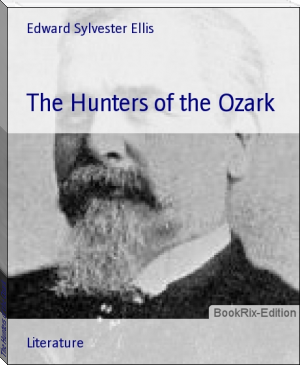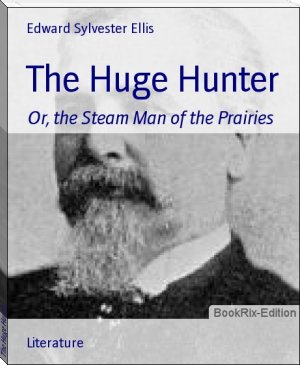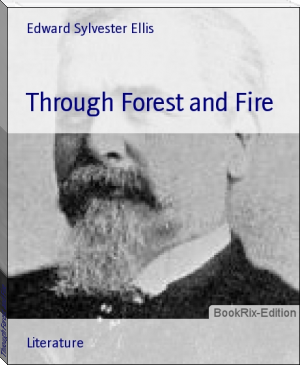The Hunters of the Ozark - Edward Sylvester Ellis (children's ebooks online .txt) 📗

- Author: Edward Sylvester Ellis
Book online «The Hunters of the Ozark - Edward Sylvester Ellis (children's ebooks online .txt) 📗». Author Edward Sylvester Ellis
and it may be they will come back to sittle with ye."
"If I alone could attend to them, do you think we together have any thing to fear?"
"Of course not, if it's only thim three, but we have seen so many of the spalpeens that they won't be loikely to foind much trouble in scarin' up a few hundred more and makin' it uncomfortable for us."
"Well," replied Fred, with a sigh, "I am so relieved and thankful to know how well we got through it all, that I am hopeful we shall have no great trouble during the rest of the way. We ought to be able to reach the camp by to-morrow night if we don't have any interruption."
The young friends surely had good reason to feel grateful for their deliverance from the perils of the morning, and with hopeful hearts they walked along the margin of the wood until they came to the point where the trail turned to the left. Over this they started at a brisk pace, Fred slightly in advance of his companion, for the path was not broad enough for them to walk any other way with freedom.
"Terry," said the elder, "do you think it possible that the three Winnebagos with whom I had the trouble could be the three that we met last night, when we were about to cross the stream?"
"Niver," was the emphatic reply; "how could they have got around so far in front? It was a good many miles the ither way that we saw the same!"
"I have thought of that, but, you know, we spent several hours in sleep, during which they might have turned back."
"But where could they have got their horses?"
"They may have had them within easy reach?"
"It couldn't be."
"I guess you are right; we hadn't a very good view of them last night, though the moon shone on them when they were wading the stream and I had a fancy that one of them looked like the fellow I hit when I fired."
"All a fancy," insisted Terry.
"Well, there's no use of guessing, for any way it must be only a guess; but where do you suppose Deerfoot is?"
"I've been thinkin' of the fellow and it saams to me that it's time he showed up."
"I wonder whether he could have passed us in the night."
"That couldn't be, for he meant to stay near the camp-fire where we lift him till he found out what the spalpeens were goin' to do, and he couldn't have got that chance till mornin'."
"Unless they made a start last night."
"Which the same they didn't do."
The boys were more in want of water than food, and fortunately they had not gone far when they struck another stream, narrow enough for them to leap across, and which afforded them a draught with which to quench their thirst.
"Now," said Fred, "since we have had such a good breakfast, we will think of nothing more to eat until night."
"I don't know about not _thinkin'_ of the same," said Terry doubtfully, "but I am with ye in agraain' that we won't go out of the path to hunt any of the same onless--that is, onless we should think what I've brought along isn't aqual to our appetites."
"We must have passed considerably more than half the distance between home and the camp in the mountains," added the elder, some minutes later; "so, if all goes well, we ought to be with our friends some time to-morrow afternoon."
"I'm of the opinion," remarked the sagacious Terry, "that Deerfut sint us on ahead last night so as to git us out uv the way; thim pritty legs of his can travel so fast that he wanted a chance to stritch the same without waitin' fur us."
"More than likely you are right; whenever he thinks it necessary, he will branch out ahead of the Winnebagos and overhaul us; so even though we see nothing of him, we ought not to feel much concern."
"How about the wither, me lad?"
Fred had noticed since resuming their journey, that the sky, which was clear and sunshiny in the morning, had become overcast. The sun was no longer visible, and a chilliness in the air warned them that the fine weather could not last much longer. They had not only been favored in this respect, but for several days before leaving home equally charming skies had spanned them. And so, in accordance with the laws of our changeable climate, a disagreeable turn was to be expected.
"I was hopeful that it would keep off until we reached camp," said Fred, looking up through the tree tops at the darkening sky; "but that is too much, and we must take it as it comes."
"Push on as fast as ye choose."
Taking his friend at his word, Fred broke into a slow, easy trot, not much more rapid than an ordinary walking gait, but one which they could keep up a long time, where the ground was not too rough. Terry of course did the same, and they covered fully two miles in that manner, when they slackened their pace before an extensive rise of the ground. But for that, they would have gone much further at the same speed.
Some fifteen minutes were spent in clambering up the stony incline, when they descended into a broad valley, the path still rough and difficult of passage. They recognized a dull but increasing roar as made by a rapid torrent, and ere long stopped on the edge of a stream fifty feet wide, which dashed and foamed over the rocks, breaking into eddies, and agitated pools, falling in foamy cataracts and splashing forward again with a rollicking freedom that formed one of the prettiest and most romantic sights on which they had ever looked.
Directly at their feet was a curious formation. By some means at a remote day, a number of hard stones had been flung downward and given a spinning motion, which, acting on the softer sandstone beneath, had begun hollowing it out, as if by the chisel of an engraver. This strange operation had gone on for years, until a bowl a dozen feet across and half as deep had been formed. It was almost mathematically round, very smooth and with a tapering shape to the bottom that made the resemblance to an enormous punch bowl strikingly accurate.
This formation (which in accordance with the taste prevailing in all parts of our country, should be christened the "Devil's Punch Bowl"), was full of limpid water, fed by a slight overflow from above and overrunning and flowing calmly over the lower rim. In the bottom lay three stones, looking like cannon balls. These were the tools with which the stream had carved the Devil's Punch Bowl. Having done their work, they were resting in the bottom, where they had lain for a period that could not be guessed.
Out beyond, a thin sheet of the water hung like a transparent curtain over the edge of the rocks. It was so smooth and unruffled that it seemed stationary, like a film of glass, but, after striking the stones below, it broke into foam, whirlpools and eddies, which helped to form as lovely and picturesque a scene as the most devoted lover of nature could long to see.
The picture was so pretty indeed that the boys stood for several minutes lost in admiration. They had never viewed any thing of the kind, and it was something that would always be a pleasant memory to them.
But, great as was their admiration, there was a startling question that came to them: how was this interesting stream to be crossed?
In front and up and down the bank, the eyes searched in vain for a ford. It was idle to think of ferrying themselves over, while the cascades, pools, eddies and general "upsetting" of a broad deep stream, made its passage as perilous as that of the rapids nearer home in which the two had come so near losing their lives.
"There is no possible way by which we can reach the other side," said Fred, after they had walked a few rods up and down the stream.
"I don't obsarve any way mesilf," was the response of Terry.
"But there _must_ be, for how could father and the rest have crossed?"
"They may have put up a bridge."
"But where is the bridge? There are no signs of any thing of the kind," said the bewildered Fred; "they couldn't have made a bridge without leaving it behind."
"The high water has swipt it away."
Fred stood surveying the stream and the banks, for several minutes, during which he once more walked back and forth, but he was right when he said that the place had never been spanned by even the simplest structure, for it could not have been done without leaving some traces behind.
This being the case, the mystery was greater than ever; for it was certain that at that hour their friends were many miles distant on the other side.
"This is a little ahead of any thing I ever heard tell of," remarked Fred, taking off his cap and scratching his head, after the fashion of Terry when he was puzzled.
"It couldn't be," ventured the latter, who also had his cap in his hand and was stirring up his flaxen locks, "that they carried a bridge along with 'em."
"Impossible!"
"That's what I thought, as me sicond cousin remarked whin they told him his uncle carried his shillaleh a half mile and passed two persons without beltin' 'em over the head."
"There's something about this which I can not understand."
Terry turned and looked at him in his quizzical way and solemnly extended his hand. Fred shook it as he wished, though he was far from feeling in a sportive mood.
"They _must_ have crossed," he added, replacing his cap with some violence, compressing his lips and shaking his head in a determined way; "do you walk up the bank, while I make a search in the other direction; we _must_ find the explanation."
The proposition was acted upon, Terry clambering carefully along the slippery bank and over the rocks, until he was fully a hundred yards from his friend, who busied himself in doing the same thing in the opposite direction.
All at once the Irish lad shouted. Looking up to him, Fred saw that he was beckoning him to approach.
"I knew there must be something of the kind," thought Fred, who after much labor placed himself beside his friend.
To his disappointment, Terry had paused before the worst part of the series of cascades. It was at the broadest portion of the stream, where the falls, whirlpools, eddies and deep water would have turned back the most skillful swimmer.
"What do you mean?" asked the astonished Fred.
"I thought I'd show you the place where they _didn't_ cross," was his reply, and then he broke into the merriest laughter, as well he might, for he had solved the mystery.
CHAPTER XXXII.
THE TERROR IN THE AIR.
"Do obsarve where the trail comes down to that big bowl?" asked Terry, pointing to the huge, circular cavity below them.
"Of course."
"Well, that's a mistake; _that isn't the right trail_."
Fred turned about, and jumped and ran back to the Devil's Punch Bowl, at a rate that threatened his neck. Stooping over, he
"If I alone could attend to them, do you think we together have any thing to fear?"
"Of course not, if it's only thim three, but we have seen so many of the spalpeens that they won't be loikely to foind much trouble in scarin' up a few hundred more and makin' it uncomfortable for us."
"Well," replied Fred, with a sigh, "I am so relieved and thankful to know how well we got through it all, that I am hopeful we shall have no great trouble during the rest of the way. We ought to be able to reach the camp by to-morrow night if we don't have any interruption."
The young friends surely had good reason to feel grateful for their deliverance from the perils of the morning, and with hopeful hearts they walked along the margin of the wood until they came to the point where the trail turned to the left. Over this they started at a brisk pace, Fred slightly in advance of his companion, for the path was not broad enough for them to walk any other way with freedom.
"Terry," said the elder, "do you think it possible that the three Winnebagos with whom I had the trouble could be the three that we met last night, when we were about to cross the stream?"
"Niver," was the emphatic reply; "how could they have got around so far in front? It was a good many miles the ither way that we saw the same!"
"I have thought of that, but, you know, we spent several hours in sleep, during which they might have turned back."
"But where could they have got their horses?"
"They may have had them within easy reach?"
"It couldn't be."
"I guess you are right; we hadn't a very good view of them last night, though the moon shone on them when they were wading the stream and I had a fancy that one of them looked like the fellow I hit when I fired."
"All a fancy," insisted Terry.
"Well, there's no use of guessing, for any way it must be only a guess; but where do you suppose Deerfoot is?"
"I've been thinkin' of the fellow and it saams to me that it's time he showed up."
"I wonder whether he could have passed us in the night."
"That couldn't be, for he meant to stay near the camp-fire where we lift him till he found out what the spalpeens were goin' to do, and he couldn't have got that chance till mornin'."
"Unless they made a start last night."
"Which the same they didn't do."
The boys were more in want of water than food, and fortunately they had not gone far when they struck another stream, narrow enough for them to leap across, and which afforded them a draught with which to quench their thirst.
"Now," said Fred, "since we have had such a good breakfast, we will think of nothing more to eat until night."
"I don't know about not _thinkin'_ of the same," said Terry doubtfully, "but I am with ye in agraain' that we won't go out of the path to hunt any of the same onless--that is, onless we should think what I've brought along isn't aqual to our appetites."
"We must have passed considerably more than half the distance between home and the camp in the mountains," added the elder, some minutes later; "so, if all goes well, we ought to be with our friends some time to-morrow afternoon."
"I'm of the opinion," remarked the sagacious Terry, "that Deerfut sint us on ahead last night so as to git us out uv the way; thim pritty legs of his can travel so fast that he wanted a chance to stritch the same without waitin' fur us."
"More than likely you are right; whenever he thinks it necessary, he will branch out ahead of the Winnebagos and overhaul us; so even though we see nothing of him, we ought not to feel much concern."
"How about the wither, me lad?"
Fred had noticed since resuming their journey, that the sky, which was clear and sunshiny in the morning, had become overcast. The sun was no longer visible, and a chilliness in the air warned them that the fine weather could not last much longer. They had not only been favored in this respect, but for several days before leaving home equally charming skies had spanned them. And so, in accordance with the laws of our changeable climate, a disagreeable turn was to be expected.
"I was hopeful that it would keep off until we reached camp," said Fred, looking up through the tree tops at the darkening sky; "but that is too much, and we must take it as it comes."
"Push on as fast as ye choose."
Taking his friend at his word, Fred broke into a slow, easy trot, not much more rapid than an ordinary walking gait, but one which they could keep up a long time, where the ground was not too rough. Terry of course did the same, and they covered fully two miles in that manner, when they slackened their pace before an extensive rise of the ground. But for that, they would have gone much further at the same speed.
Some fifteen minutes were spent in clambering up the stony incline, when they descended into a broad valley, the path still rough and difficult of passage. They recognized a dull but increasing roar as made by a rapid torrent, and ere long stopped on the edge of a stream fifty feet wide, which dashed and foamed over the rocks, breaking into eddies, and agitated pools, falling in foamy cataracts and splashing forward again with a rollicking freedom that formed one of the prettiest and most romantic sights on which they had ever looked.
Directly at their feet was a curious formation. By some means at a remote day, a number of hard stones had been flung downward and given a spinning motion, which, acting on the softer sandstone beneath, had begun hollowing it out, as if by the chisel of an engraver. This strange operation had gone on for years, until a bowl a dozen feet across and half as deep had been formed. It was almost mathematically round, very smooth and with a tapering shape to the bottom that made the resemblance to an enormous punch bowl strikingly accurate.
This formation (which in accordance with the taste prevailing in all parts of our country, should be christened the "Devil's Punch Bowl"), was full of limpid water, fed by a slight overflow from above and overrunning and flowing calmly over the lower rim. In the bottom lay three stones, looking like cannon balls. These were the tools with which the stream had carved the Devil's Punch Bowl. Having done their work, they were resting in the bottom, where they had lain for a period that could not be guessed.
Out beyond, a thin sheet of the water hung like a transparent curtain over the edge of the rocks. It was so smooth and unruffled that it seemed stationary, like a film of glass, but, after striking the stones below, it broke into foam, whirlpools and eddies, which helped to form as lovely and picturesque a scene as the most devoted lover of nature could long to see.
The picture was so pretty indeed that the boys stood for several minutes lost in admiration. They had never viewed any thing of the kind, and it was something that would always be a pleasant memory to them.
But, great as was their admiration, there was a startling question that came to them: how was this interesting stream to be crossed?
In front and up and down the bank, the eyes searched in vain for a ford. It was idle to think of ferrying themselves over, while the cascades, pools, eddies and general "upsetting" of a broad deep stream, made its passage as perilous as that of the rapids nearer home in which the two had come so near losing their lives.
"There is no possible way by which we can reach the other side," said Fred, after they had walked a few rods up and down the stream.
"I don't obsarve any way mesilf," was the response of Terry.
"But there _must_ be, for how could father and the rest have crossed?"
"They may have put up a bridge."
"But where is the bridge? There are no signs of any thing of the kind," said the bewildered Fred; "they couldn't have made a bridge without leaving it behind."
"The high water has swipt it away."
Fred stood surveying the stream and the banks, for several minutes, during which he once more walked back and forth, but he was right when he said that the place had never been spanned by even the simplest structure, for it could not have been done without leaving some traces behind.
This being the case, the mystery was greater than ever; for it was certain that at that hour their friends were many miles distant on the other side.
"This is a little ahead of any thing I ever heard tell of," remarked Fred, taking off his cap and scratching his head, after the fashion of Terry when he was puzzled.
"It couldn't be," ventured the latter, who also had his cap in his hand and was stirring up his flaxen locks, "that they carried a bridge along with 'em."
"Impossible!"
"That's what I thought, as me sicond cousin remarked whin they told him his uncle carried his shillaleh a half mile and passed two persons without beltin' 'em over the head."
"There's something about this which I can not understand."
Terry turned and looked at him in his quizzical way and solemnly extended his hand. Fred shook it as he wished, though he was far from feeling in a sportive mood.
"They _must_ have crossed," he added, replacing his cap with some violence, compressing his lips and shaking his head in a determined way; "do you walk up the bank, while I make a search in the other direction; we _must_ find the explanation."
The proposition was acted upon, Terry clambering carefully along the slippery bank and over the rocks, until he was fully a hundred yards from his friend, who busied himself in doing the same thing in the opposite direction.
All at once the Irish lad shouted. Looking up to him, Fred saw that he was beckoning him to approach.
"I knew there must be something of the kind," thought Fred, who after much labor placed himself beside his friend.
To his disappointment, Terry had paused before the worst part of the series of cascades. It was at the broadest portion of the stream, where the falls, whirlpools, eddies and deep water would have turned back the most skillful swimmer.
"What do you mean?" asked the astonished Fred.
"I thought I'd show you the place where they _didn't_ cross," was his reply, and then he broke into the merriest laughter, as well he might, for he had solved the mystery.
CHAPTER XXXII.
THE TERROR IN THE AIR.
"Do obsarve where the trail comes down to that big bowl?" asked Terry, pointing to the huge, circular cavity below them.
"Of course."
"Well, that's a mistake; _that isn't the right trail_."
Fred turned about, and jumped and ran back to the Devil's Punch Bowl, at a rate that threatened his neck. Stooping over, he
Free e-book «The Hunters of the Ozark - Edward Sylvester Ellis (children's ebooks online .txt) 📗» - read online now
Similar e-books:





Comments (0)